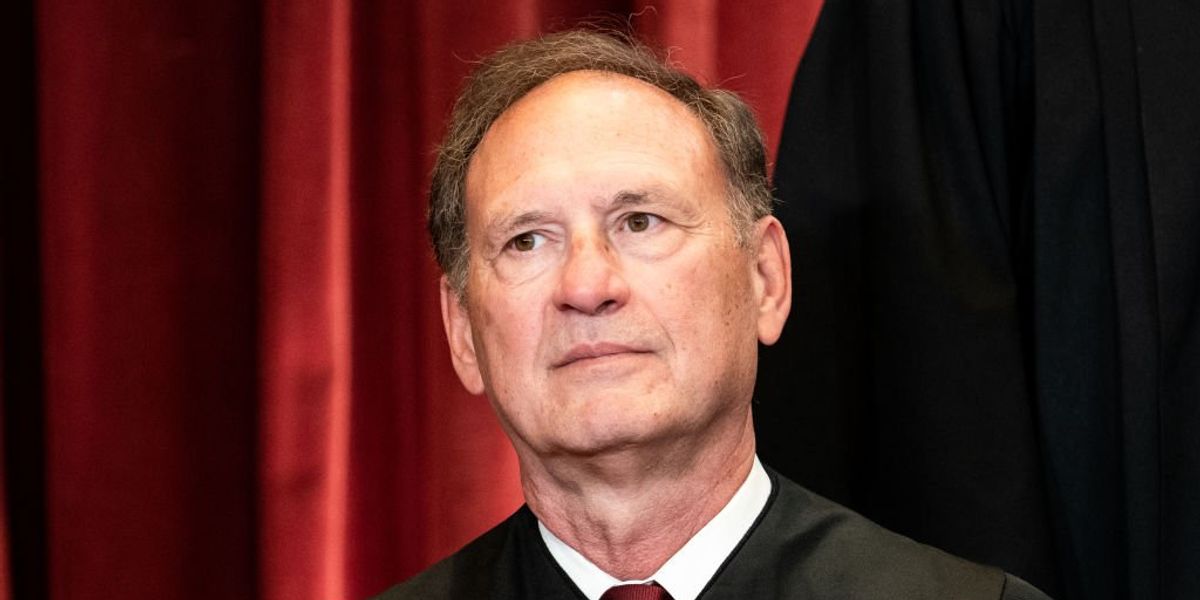

Unlike certain recent additions to the U.S. Supreme Court, Justice Samuel Alito has consistently delivered for God-fearing conservatives and constitutionalists.
This consistency and Alito's resistance to the fads of the day have made him a popular target for Democratic lawmakers and other radical leftists, along with their fellow travelers in the liberal media.
Democrats including Sen. Dick Durbin (Ill.) and House Democratic Leader Hakeem Jeffries (N.Y.) have, for instance, pressured Alito to recuse himself from cases of consequence. Other Democrats, such as Sen. Elizabeth Warren (Mass.), have painted a target on his back, calling him a "threat to our democracy." Liberal publications such as the New York Times and ProPublica have pushed false narratives framing him as an extremist or at the very least as unethical. A false-flagger who helped the Lincoln Project stage a fake white supremacist rally in 2021 futilely tried to catch Alito saying something damning on tape. A radical even allegedly threatened to assassinate him last year.
Alito underscored in his recent interview with Peter Robinson, host of the Hoover Institution's "Uncommon Knowledge," that the judiciary has a responsibility to resist possession by the zeitgeist and to do what is right, even if unpopular.
In 2022, Alito gave a speech in Rome at a religious liberty summit convened by the Religious Liberty Initiative of the University of Notre Dame's law school, where he underscored that religious liberty is far more than just "freedom of worship."
'Had every Athenian citizen been a Socrates; every Athenian assembly would still have been a mob.'
"Freedom of worship means freedom to do these things that you like to do in the privacy of your home, or in your church or your synagogue or your mosque or your temple. But when you step outside into the public square, in the light of day, you had better behave yourself like a good secular citizen," said the conservative justice. "That's the problem that we face."
RELATED: American de-Christianization: Why it's happening and what it will mean for the republic
 Photo by VCG Wilson/Corbis via Getty Images
Photo by VCG Wilson/Corbis via Getty Images
When asked in the interview published Wednesday to expound on his suggestion in the Rome speech, Alito told Robinson, "I think it is the problem that we face because support for religious liberty, unfortunately, has cratered in the last 20, 25 years."
After Alito raised the matter of how the U.S. Constitution singles out religion and gives it protection that is not similarly afforded to views that are not religiously based, Robinson said, "I can't remember who it was who said that it's fair to expect the judicial system to ignore the politics of the day but naive to expect the judicial system to remain unaffected by the politics of the era — something like that. And if public support for religion, public practice of religion — if the support, as you just said, is 'cratering' — what can the court do over the long term?"
Alito indicated that the Constitution wouldn't turn on a faithful minority just because the majority turned on faith.
"There's a reason why we're not elected. We are not supposed to do what is popular. We're supposed to do what is right," said Alito. "We're supposed to interpret the Constitution and figure out what it means, and then apply the Constitution. That's the purpose of this institution, the core purpose of this institution."
RELATED: Secularists think they won at the Supreme Court — but they’ll lose in the end
 Photo by CHIP SOMODEVILLA/POOL/AFP via Getty Images
Photo by CHIP SOMODEVILLA/POOL/AFP via Getty Images
While suggesting that America is "basically a democratic country," Alito noted that the Framers, wary of the mob and its impulses, applied "some restraint on things that people might do."
James Madison was among the Founding Fathers aware of the need for checks on the mob, noting in Federalist No. 55 that "passion never fails to wrest the scepter from reason. Had every Athenian citizen been a Socrates; every Athenian assembly would still have been a mob."
In Federalist No. 51, Madison discussed how the republican government could serve as a check on the tyranny of the majority, ensuring that the "rights of individuals, or of the minority, will be in little danger from interested combinations of the majority."
"We have to stand firm on this, and I think we have done a pretty good job on it," said Alito, "but we have to keep it up because challenges ... will continue to come."
Like Blaze News? Bypass the censors, sign up for our newsletters, and get stories like this direct to your inbox. Sign up here!
.png)
 6 hours ago
2
6 hours ago
2















 English (US)
English (US)